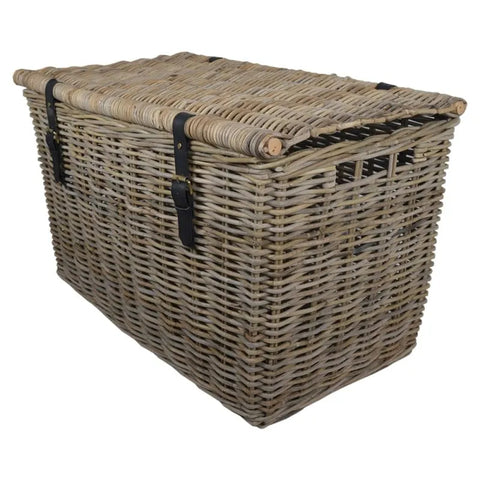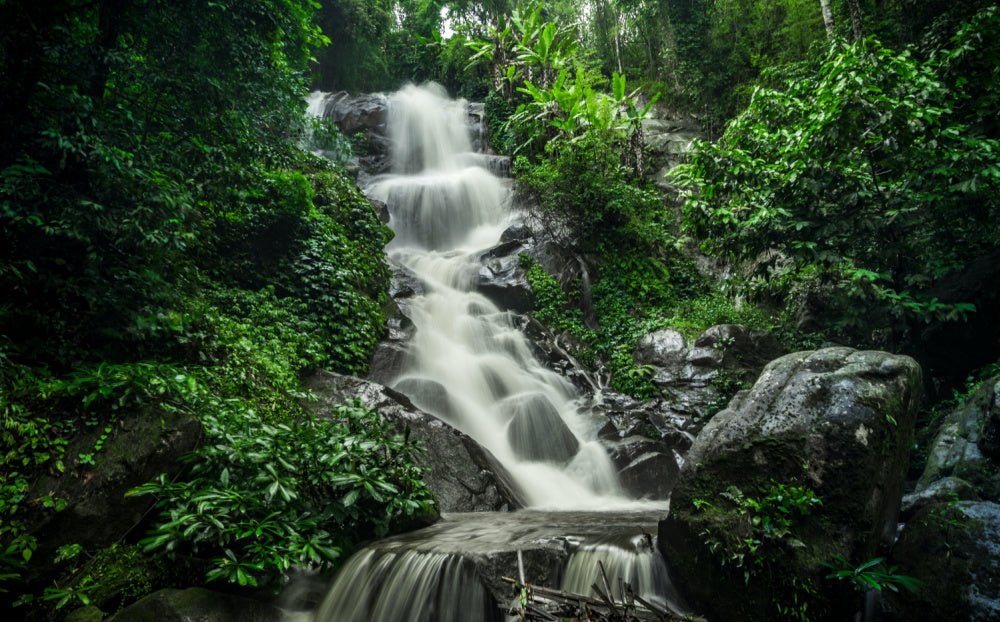When it comes to home storage, wicker baskets are renowned for being a timeless favourite, ideal for those looking for the perfect balance between stylish and practical.
But if you’re wondering what wicker baskets are made of or which material is best for long-lasting quality - you’re in the right place. And we’re here to help!
In this article, we’ll be talking about the most commonly used materials for wicker baskets - and letting you in on why natural is always considered best.
Read on to discover what wicker baskets are made from…

Kubu Rattan Storage Trunk - shop now.
The materials used to create wicker baskets
Wicker is commonly mistaken for a material. It’s actually a technique! If you’d like to learn more about this, click here to read all about it.
In reality, there are two core types of wicker baskets - those that are made from synthetic materials and those made from natural materials.
Synthetic materials
The most common synthetic materials associated with wicker baskets are plastic variations, resin and synthetic rattan.
Plastic
Although the type of plastic used to create wicker baskets can vary depending on the retailer, it’s safe to assume that it’ll (almost always) be made out of polyethylene.
Polyethylene can be defined as a thermoplastic polymer, which is made from the monomer ethylene. It’s a lightweight material, commonly used to create a wide range of items we see in our everyday lives. In fact, it’s the most frequently used type of plastic in the world.
This type of plastic creates various random items, such as packaging, plastic shopping bags, toys, pipes, electrical wire coatings, toothbrushes, and combs. We could go on, but you get the idea!
Although plastic wicker baskets have their fair share of disadvantages, polyethylene produces the most weather-resistant, versatile and durable option. Plus, this type of plastic is easier to mould into different shapes to create a variety of wicker basket sizes and styles.
Resin
Resin is a term used to describe a range of liquid polymers, most commonly associated with creating adhesives, such as epoxy.
When we talk about resin wicker baskets, we’re talking about the coating, as these basket types are probably also made from polyethylene or synthetic rattan, but with the addition of a resin coating.
This material is desirable for those who plan on storing the wicker basket outdoors, as the resin will make it more durable and weather resistant.
Synthetic rattan
Synthetic rattan refers to a style rather than a material. This is because it can be made of various man-made fibres and plastics, formally known as polyethylene (which we touched on earlier!), PVC, and polypropylene.
Although synthetic rattan does share a resemblance to natural rattan, it can’t quite mimic the texture. So, the look and feel are both slightly off, making it easy to distinguish whether or not it’s synthetic. So, if you’re looking to add a natural touch to your home - we recommend staying away from synthetic rattan.
Natural materials
For many reasons, wicker baskets made from quality raw materials are viewed as a much more desirable option. After all, there’s a reason why they’ve been used for thousands of years!
We’ll get into why it’s best to opt for natural later on in the article, but some of the main benefits are:
- Kinder to the planet - natural materials used to create wicker baskets can be regenerated, making them a much more eco-friendly option.
- Aesthetic - raw materials create a more attractive, well-rounded wicker basket, particularly suited to those looking to add a touch of natural beauty to their space.
- Variety - there’s so much choice with wicker baskets constructed from natural materials. That’s why you’ll be able to find an abundance of styles, designs, types and sizes.
- Quality - when compared to plastic, premium raw materials significantly outperform their artificial counterparts.
- Made to last - raw materials create long-lasting solutions that are incredibly durable and sturdy, so you won’t have to replace them frequently!
The most universally adored natural materials for wicker baskets include premium quality rattan, split bamboo, water hyacinth, and Kubu rattan. We’ll go into more detail about each of these below.
Rattan
Formally known as Calamus, rattan can be defined as a type of climbing plant that naturally grows throughout tropical rainforests, such as in Indonesia, Africa and Australia.
Wicker baskets produced from rattan are typically recognised for impressive strength and durability qualities, making them a superb choice for creating long-lasting storage solutions.
What’s more, rattan is renowned for being one of the most sustainable natural resources for wicker basket creation. This is because rattan can be grown and harvested without causing harm, thanks to its impressive ability to regenerate.
In fact, depending on the location, it’s not uncommon to see several species of rattan to grow hundreds of feet tall.
Plus, there are over 600 species of rattan that we know of. But the most common types grown and harvested to create wicker baskets are species that are categorised as climbing plants.

Set of 3 Milton Brown Rattan Storage Baskets - shop now.
Kubu Rattan
If wicker baskets that boast a rustic, earthy aesthetic sound lovely to you, then you need to keep an eye out for those made from Kubu Rattan.
The location most famous for producing the best quality Kubu rattan is Borneo, Indonesia. The environmental conditions combined with their abundance of lush forests make it an ideal place for Kubu rattan growth to thrive!
Kubu rattan undergoes treatment, which makes this natural material particularly strong, durable and resistant to damage.
The treatment process usually consists of soaking the rattan in water to make it easier to weave. If left to dry out naturally in the sun, Kubu rattan can develop a delicate beige colouring. Alternatively, it can also be stained using mud, which gives it a permanent, beautiful soft grey tone.

Kubu Rattan Tall Oblong Log Basket with Wheels - shop now.
Water Hyacinth
Water hyacinth can be defined as an untreated natural material that offers the flexibility and fibrous tissue needed to create beautiful woven baskets. It’s an aquatic plant, native to continents with warm climates, such as Asia and South America.
Water hyacinth has soared in popularity over the last few years, simply because of how sustainable it is! Eco-conscious consumers are becoming more aware of what it can create when it comes to beautiful storage solutions and opting for this incredible alternative in droves.
In addition to water hyacinth being an incredibly eco-friendly material, it’s also popular for its practical qualities, too. It’s naturally durable, strong and sturdy, yet this doesn’t compromise its overall flexibility. So, skilled weavers can create a vast range of styles and designs, which is why we see many choices with water hyacinth wicker baskets. Oh, and it can withstand high temperatures - making it an ideal material for log baskets.

Milton Natural Rattan Laundry Basket - shop now.
Split Bamboo
Native across the dense forestlands of Asia, split bamboo is another incredibly sought-after natural resource for wicker baskets. And interestingly, for those who don’t know, bamboo is actually a type of grass - formally known as part of the Poaceae family.
Wicker baskets made from split bamboo are an incredibly reliable investment for the home, offering a lightweight and visually appealing solution to storage needs.
Another interesting fact about split bamboo is that it follows a similar treatment process to Kubu rattan. It’s harvested, segmented into strips (hence the name ‘split’ bamboo), and then left to soak in water to make it more flexible and easier to weave.
Similar to other natural materials used to create sustainable wicker baskets, split bamboo can create a wide range of basket types, styles, designs and sizes, because of how flexible it is to work with. Split bamboo is also particularly good at wicking away moisture, which is why bamboo log baskets are ideal for storing away firewood.

Bamboo Rattan Rectangle Storage Log Basket with Wheels and Hoop Handles - shop now.
Why you should always choose natural materials for wicker baskets
The answer is simple. Natural materials create better and more visually attractive wicker baskets - without having a detrimental effect on the environment.
Take polyethylene as a prime example of a harmful, synthetic material. As we mentioned earlier, this type of plastic is commonly used to create wicker baskets, and it’s actually one of the most harmful plastic materials in circulation.
Generally speaking, plastic isn’t biodegradable. This means it’ll pollute the environment for hundreds of years, not to mention its effects regarding its ability to produce harmful greenhouse gases.
In addition to the above, plastic wicker baskets aren’t as durable or long-lasting as their natural counterparts - especially if you’re using them as reliable storage solutions. These materials are prone to breaking and/or cracking, likely due to being mass-produced, with little to no focus on quality or craftsmanship.
It’s worth highlighting, however, that although natural resources are better in every instance,
you’ll still need to consider the quality of the materials before committing to purchase, along with where they are sourced from. Combat this by choosing a reputable retailer who knows their stuff.
Wovenhill - the home of premium, natural wicker baskets
We may be biased, but here at Wovenhill, we firmly consider our wicker baskets to be the best and most versatile storage solutions on the market. The skill and care that goes into every single one of our wicker baskets are what make us stand out from the rest.
We’ve carefully curated our vast offering so that we can ensure to deliver not only exceptional quality - but also an abundance of choice.
From laundry baskets and multi-purpose storage to trunks and hampers, log baskets and pet beds, we’re proud to offer an extensive range of premium quality storage products at fair prices. Plus, we offer many sizes and products with added features - making it easier to find the perfect wicker feature for your home.
Not only that, but we care about the environment and our impact as a company. That’s why we only use ever use natural, renewable materials that are ethically sourced to create our wicker storage solutions.
So remember, when you choose Wovenhill - you can rest assured that you’re investing in beautiful, long-lasting storage solutions that are kinder to our planet.
Explore the rest of our website to find what you’ve been looking for today.



